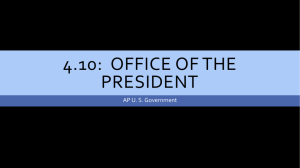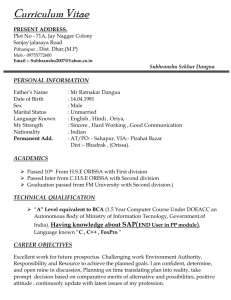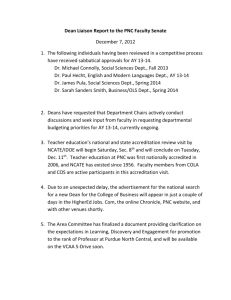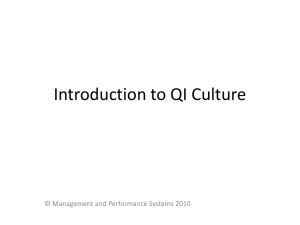File
advertisement
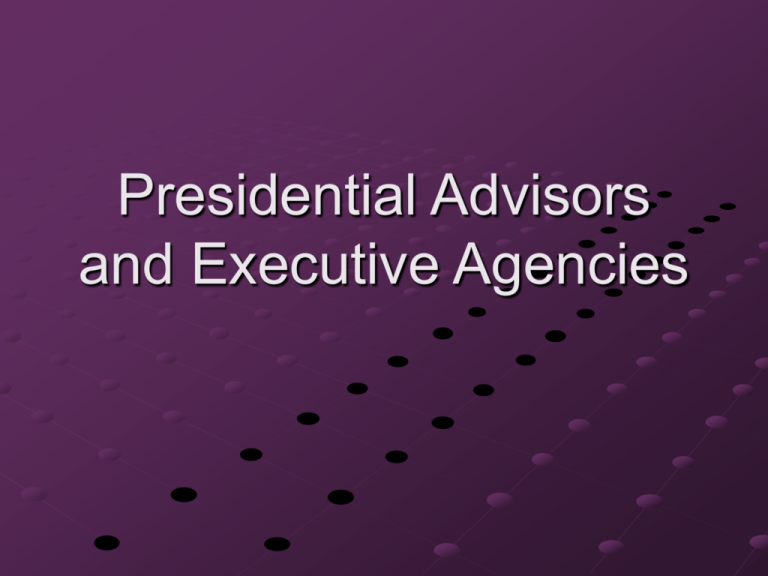
Presidential Advisors and Executive Agencies Section 3:Executive Departments and the Cabinet The Executive Office of the President Contains agencies and offices that advise the president on current issues Established in 1939 and reorganized by each president The White House Office keeps the presidential schedule, writes speeches, and maintains relations with Congress, the press, and the public. Organization of the Executive Branch Executive Office/White House Office People who work directly for the President (about 500) 10-12 of the President’s closest advisors Chief of Staff is most powerful advisor Organization of the Executive Branch Office of Management and Budget Prepares the federal budget Oversees spending of hundreds of government agencies Director of OMB works closely with the President Organization of the Executive Branch National Security Council Helps the President direct US military and foreign policy Head is National Security Advisor Organization of the Executive Branch Council of Economic Advisors Helps the President carry out the role of the economic leader Gives the President advice about complex economic matters (unemployment, inflation, taxes, etc.) The Cabinet Cabinet Group of 15 presidential advisors that include the heads (Secretaries) of top level executive departments Secretaries advise the President on issues related to their department They meet whenever the President calls them together Dept of Homeland Security is the newest cabinet position (added in Nov 2002) The Cabinet Dept of State Plans and carries out the nation’s foreign policy Hillary Clinton Dept of Treasury Collects, borrows, spends, and prints money Timothy Giethner Dept of Defense Manages the military Robert Gates Dept of Justice Responsible for all aspects of law enforcement Eric Holder Dept of Interior Manages and protects the nations public lands and natural resources Ken Salazar The Cabinet Dept of Agriculture Assists farmers and consumers of products Tom Vilsack Dept of Commerce Supervises trade and promotes US business Gary Locke Dept of Labor Deals with working conditions and wages Hilda Solis Dept of Health & Human Services Works for the well being & health of Kathleen Americans Sebelius Dept of Housing & Urban Development Deals with special needs and problems of cities Shaun Donovan The Cabinet Dept of Transportation Manages nations highways, railroads, airlines, & sea traffic Ray LaHood Dept of Energy Directs overall energy plan Steven Chu Dept of Education Provides advice and funding for schools Arne Duncan Dept of Veteran’s Affairs Directs services for armed force Eric Shenseki veterans Dept of Homeland Security Oversees America’s defenses against terrorist attacks Janet Napolitano Federal Bureaucracy Federal Bureaucracy- agencies and employees of the executive branch Carry out programs created by Congress Administer day to day functions of the Executive Branch Regulate various activities (police, banks, airlines, etc.) Federal Bureaucracy cont Independent Agencies- agencies of the Executive Branch that are NOT part of the cabinet Executive Agencies Independent and deal with certain specialized areas within government Ex. National Aeronautics and Space Administration (NASA) Federal Bureaucracy cont Government Corporations Private businesses owned and operated by the government and not private people Ex. Postal Service (USPS) Regulatory Boards and Commissions Do no report to President, but instead to Congress Protect the public by making and enforce rules for industries or groups Ex. Federal Communications Commission (FCC) Government Workers Political Appointees- top leadership positions whom the President has chosen because they have proven executive ability (usually ends when the President leaves office) Civil Service Workers- permanent employment, based on competitive tests and merit They work within the Civil Service System Spoils System Became very popular under Andrew Jackson Government jobs went to people as a reward for their political support New President’s fired most workers and replaced them with their own Ex. Jackson put Martin Van Buren as Sec. of State and then VP because he was Jackson’s campaign manager and helped Jackson win the election Ex. Jackson made Roger Taney Supreme Court Chief Justice because he helped Jackson remove all of the money from the national bank because Jackson opposed it Merit System Came about during Progressive Era with the Pendleton Act Known as Civil Service Reform Act of 1883 Now jobs within the Civil Service System are awarded based on merit and examinations Sets standards for federal jobs

